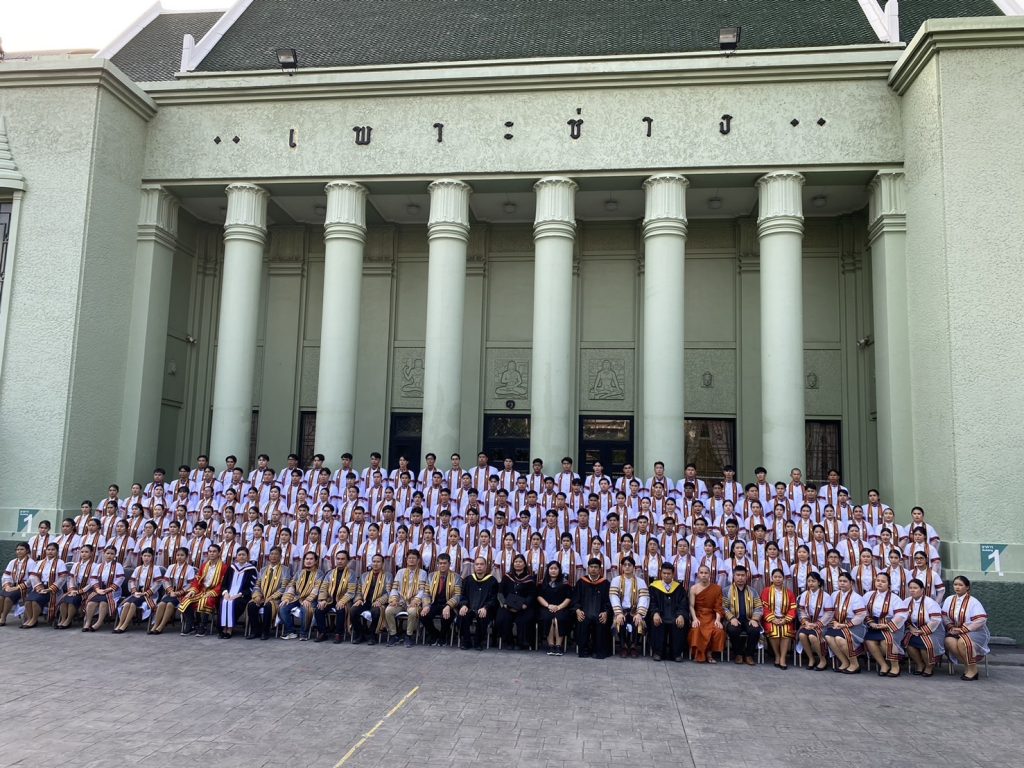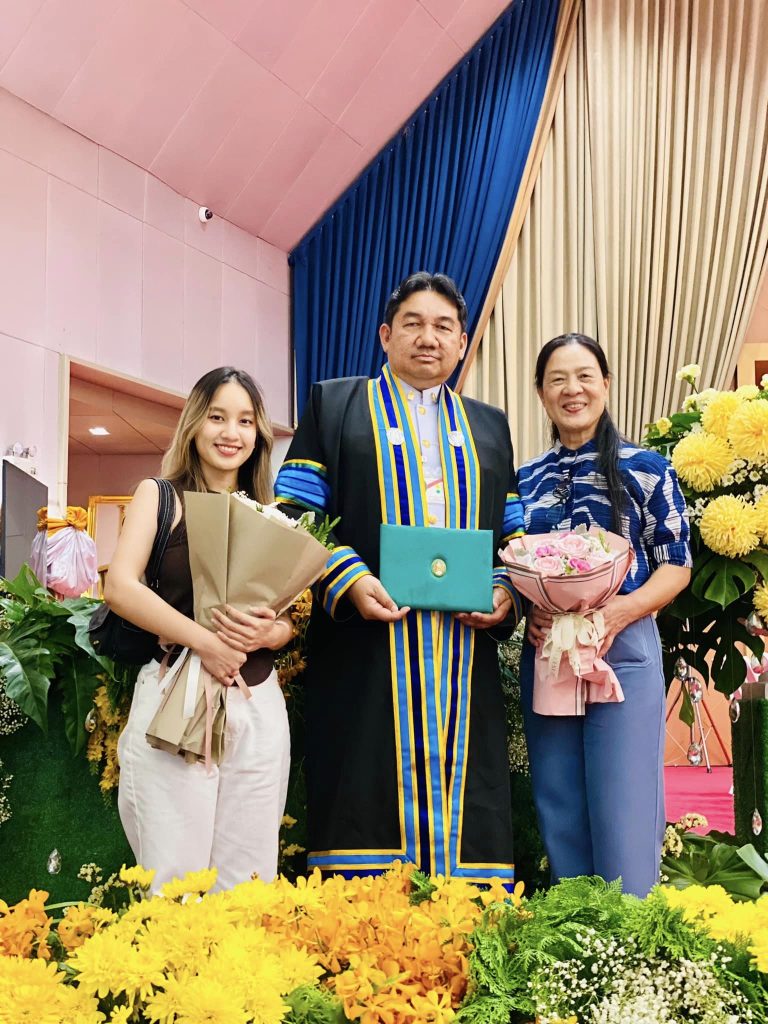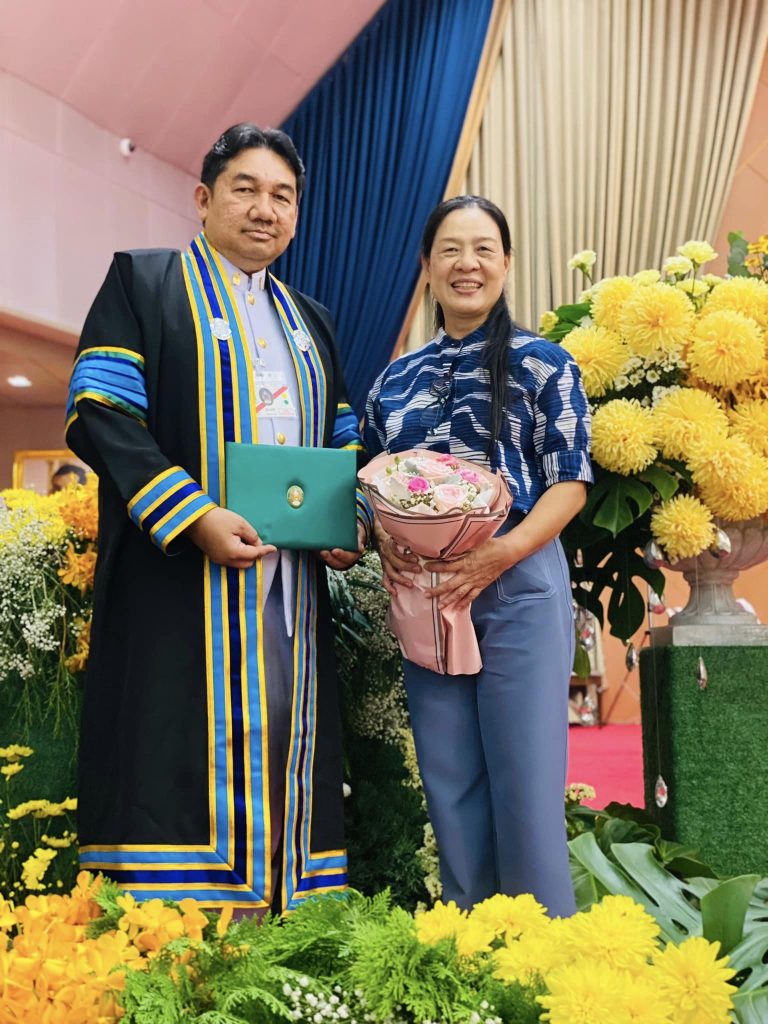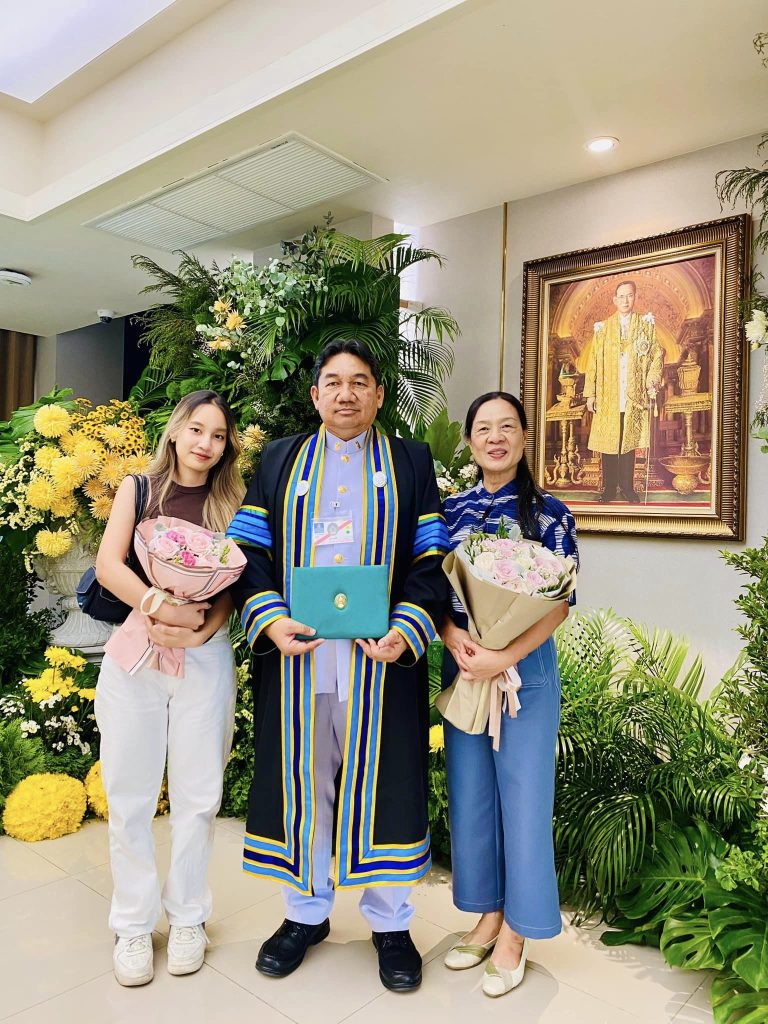เรื่องทั้งหมดโดย admin
ง่ายเกินไป
The Effectiveness of Flipped Classroom in English Language Learning: A Meta-Analysis
Abstract
The Flipped Classroom (FC) model, a teaching method used in various educational settings, including language learning, aims to improve student engagement and understanding. Its application in English language learning involves restructuring traditional teaching and learning methods. This study was meticulously designed to assess FC’s effectiveness in improving English language proficiency. A comprehensive meta-analysis was conducted on research articles from January 2021 to November 2023, retrieved from ERIC and the Scopus Index. After a rigorous independent review and data extraction process by two reviewers, nine studies with a total of 705 participants were included. The methodological quality of the selected articles was evaluated using the Fail-Safe N for Publication Bias Assessment. The results, which showed that FC was more effective than conventional methods in enhancing overall English language proficiency (SMD=0.85, 95% CI -0.57 to 1.12, P<.001, I2=65.45%), knowledge (SMD=0.84, 95% CI -0.55 to 1.12, P<.001, I2=49.49%), and skills (SMD=0.70, 95% CI -0.30 to 1.11, P<.01, I2=75.97%), instill confidence in the robustness of our findings. These results suggest that FC has the potential to significantly improve English language acquisition outcomes. However, further research with larger sample sizes is needed to confirm and strengthen these results.
Keywords: flipped learning, flipped classroom, teaching english, english educational, meta-analysis
Thada Jantakoon, Kitsadaporn Jantakun, Thiti Jantakun, Atjana Noibuddee, Rungfa Pasmala, Panita Wannapiroon, Prachyanun Nilsook (2025) The Effectiveness of Flipped Classroom in English Language Learning: A Meta-Analysis. World Journal of English Language Vol. 15, No. 3; 2025, pp. 50-64.
https://doi.org/10.5430/wjel.v15n3p50
สไลด์บรรยาย Using AI for Research
สไลด์บรรยาย “Generative AI เพื่อพัฒนาผลงานทางวิชาการอย่างสร้างสรรค์และมีประสิทธิภาพ”ณ อวานี ขอนแก่น โฮเทล แอนด์ คอนเวนชั่น เซ็นเตอร์ จัดโดย วิทยาลัยดุริยางคศิลป์ มหาวิทยาลัยมหาสารคาม 12 ธันวาคม 2567
https://ict.fte.kmutnb.ac.th/prachyanun/ppt/AI_Tools_for_Research_Version2.pdf
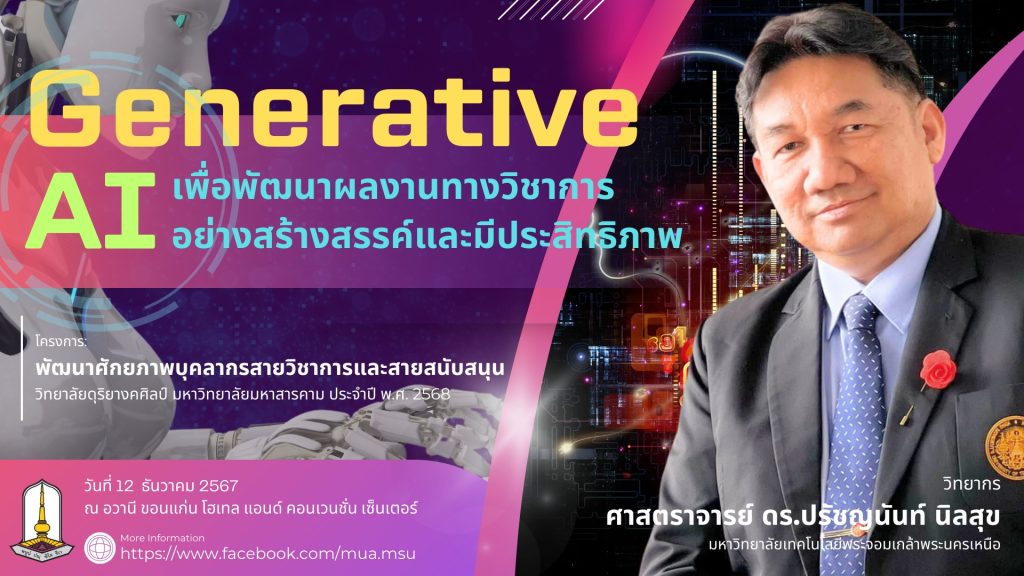
Mobile Language Learning: A Digital Approach to Improving English Communication
Abstract
A digital media platform can enhance students’ motivation and help them learn new abilities to further their English communication skills. They can utilize it to improve their English communication skills through their mobile phones for lifelong learning and to integrate digital media technology into their study and work worldwide, developing 21st-century abilities and skills. This study aimed to create a digital media platform, improve students’ English communication skills, and study students’ satisfaction with using the digital media platform through mobile language learning. A sample of 107 students participated in the self-learning of English for Daily Life Communication course, which was selected using a simple random sampling technique. The digital media platform included videos and practices of 20 contents about English communication for daily life. The experiment was carried out for five weeks. The research instruments included digital media platform, a pre-and post-test, and a satisfaction questionnaire. The data were statistically analyzed by mean and standard deviation. The results revealed that the students improved their English communication skills at the .005 significance and were satisfied at a mean of 4.31. It concludes that the digital media platform benefits by enhancing the students based on their findings on improving their English communication skills and overall satisfaction. Additionally, both the educators and students are supported in achieving successful foreign language learning through mobile technology.
Keywords:
Digital Media Platform, English Communication, Mobile Language Learning
Boonyopakorn, J., Tasatanattakool, P., Nilsook, P., & Wannapiroon, P. (2024). Mobile Language Learning: A Digital Approach to Improving English Communication. International Journal of Interactive Mobile Technologies (iJIM), 18(22), pp. 159–173. https://doi.org/10.3991/ijim.v18i22.50001
บัณฑิตนีโน่
บัณฑิตนีโน่
ปราชญวศิน นิลสุข
ศิลปบัณฑิต (ออกแบบภายใน)
วิทยาลัยเพาะช่าง มหาวิทยาลัยเทคโนโลยีราชมงคลรัตนโกสินทร์
วันที่ 22 พฤศจิกายน พ.ศ.2567

ดุษฎีบัณฑิตกิตติมศักดิ์
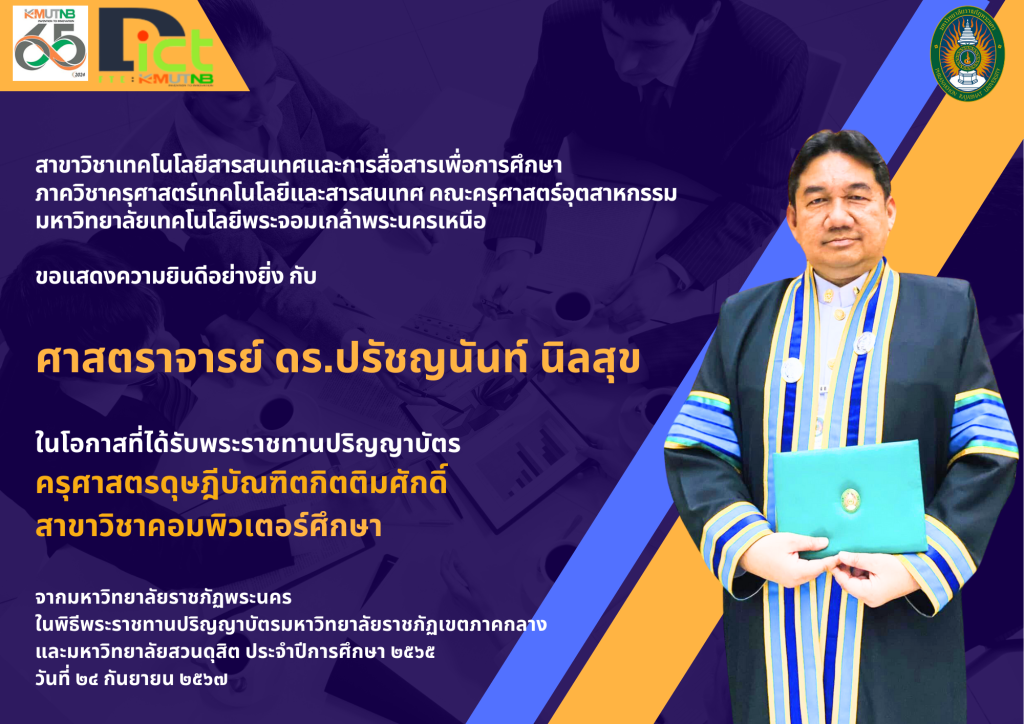
ขอบพระคุณสภามหาวิทยาลัยราชภัฏพระนคร ที่อนุมัติปริญญาครุศาสตร์ดุษฎีบัณฑิตกิตติมศักดิ์ สาขาวิชาคอมพิวเตอร์ศึกษา อันเป็นเกียรติยศแก่กระผมและครอบครัวเป็นอย่างยิ่ง จะขอรักษาเกียรติแห่งปริญญากิตติมศักดิ์ให้สมฐานะดุษฎีบัณฑิตกิตติมศักดิ์ แห่งวิทยาลัยการฝึกหัดครู มหาวิทยาลัยราชภัฏพระนคร สืบไปครุศาสตรดุษฎีบัณฑิตกิตติมศักดิ์ สาขาวิชาคอมพิวเตอร์ศึกษา จากมหาวิทยาลัยราชภัฏพระนคร ในพิธีพระราชทานปริญญาบัตรมหาวิทยาลัยราชภัฏเขตภาคกลาง และมหาวิทยาลัยสวนดุสิต ประจำปีการศึกษา 2565 วันที่ 24 กันยายน 2567 ณ หอประชุมสิริวรปัญญา มหาวิทยาลัยราชภัฏนครปฐม
Research Zone (2024) : Phase 204 เดือนกันยายน 2567
Research Zone (2024) : Phase 204 เดือนกันยายน 2567 การวิเคราะห์บรรณมิติ และการออกแบบการวิจัย (Research Design Canvas) เพื่อวิจัยทางการศึกษา ศ.ดร.ปรัชญนันท์ นิลสุข มหาวิทยาลัยเทคโนโลยีพระจอมเกล้าพระนครเหนือ วันจันทร์ที่ 23 กันยายน 2567 เวลา 09.00-16.00 น. ณ ศูนย์จัดการความรู้และถ่ายทอดผลงานวิจัย วช.
Rajabhat Talk: ศาสตราจารย์ ดร.ปรัชญนันท์ นิลสุข ปริญญาครุศาสตรดุษฎีบัณฑิตกิตติมศักดิ์
ศาสตราจารย์ ดร.ปรัชญนันท์ นิลสุข ปริญญาครุศาสตรดุษฎีบัณฑิตกิตติมศักดิ์ สาขาวิชาคอมพิวเตอร์ศึกษา มหาวิทยาลัยราชภัฏพระนคร รายการ Rajabhat Talk บันทึกเทปงานพระราชทานปริญญาบัตร มหาวิทยาลัยราชภัฏเขตภาคกลาง และมหาวิทยาลัยสวนดุสิต ประจำปีการศึกษา 2565 ระหว่างวันที่ 19-26 กันยายน 2567 ณ มหาวิทยาลัยราชภัฏนครปฐม
การวิเคราะห์ความสัมพันธ์ของปัจจัยความสามารถในการใช้งานเว็บไซต์หน่วยงานภาครัฐระดับกระทรวง
บทคัดย่อการวิจัยนี้มีจุดมุ่งหมายเพื่อวิเคราะห์ความสัมพันธ์ของปัจจัยความสามารถในการใช้งานของเว็บไซต์ หน่วยงานภาครัฐระดับกระทรวง กลุ่มตัวอย่างที่ใช้ในการวิจัย คือเว็บไซต์หน่วยงานภาครัฐระดับกระทรวงในประเทศไทย
จำนวน 20 เว็บไซต์ และประชาชนผู้เคยเข้าใช้งานเว็บไซต์ จำนวน 427 คนเครื่องมือที่ใช้ในการวิจัยครั้งนี้ คือ แบบสอบถามและแบบบันทึกข้อมูลเว็บไซต์ ผลการวิจัยพบว่า ความสัมพันธ์ของปัจจัยความสามารถในการใช้งานของเว็บไซต์ หน่วยงานภาครัฐระดับกระทรวง พบว่า มีปัจจัย 5 ด้าน ที่มีความสัมพันธ์กับความสามารถในการใช้งานของเว็บไซต์หน่วยงานภาครัฐระดับกระทรวงในระดับปานกลาง ได้แก่ ปัจจัยด้านการให้บริการของหน่วยงาน ปัจจัยด้านการมีส่วนร่วมของประชาชน ปัจจัยด้านคุณลักษณะที่ควรมี ปัจจัยด้านความมั่นคงปลอดภัยสำหรับเว็บไซต์ และปัจจัยด้านการประกาศนโยบาย มีปัจจัย 3 ด้านมีความสัมพันธ์ในการใช้งานของเว็บไซต์หน่วยงานภาครัฐระดับกระทรวงในระดับค่อนข้างต่ำ ได้แก่ ปัจจัยด้านการตั้งชื่อเว็บไซต์ภาครัฐปัจจัยด้านข้อมูลพื้นฐานเกี่ยวกับหน่วยงานและปัจจัยด้านข้อมูลเปิดภาครัฐ
คำสำคัญ : ความสามารถในการใช้งานของเว็บไซต์ ,เว็บไซต์หน่วยงานภาครัฐ, การวิเคราะห์เว็บไซต์
คฑาวุธ เกษสระ, ศุมรรษตรา แสนวา และปรัชญนันท์ นิลสุข (2567)
การวิเคราะห์ความสัมพันธ์ของปัจจัยความสามารถในการใช้งานเว็บไซต์หน่วยงานภาครัฐระดับกระทรวง.
วารสารมนุษยศาสตร์และสังคมศาสตร์ มหาวิทยาลัยธนบุรี. 18(3), 52–61.
https://so03.tci-thaijo.org/index.php/trujournal/article/view/274753/185276
Kessara, K., Saenwa, S. ., & Nilsook, P. . (2024).
An Analysis Relationship of the Usability Factors of Government Ministry Websites in Thailand.
Journal of Humanities and Social Sciences Thonburi University, 18(3), 52–61.Retrieved from https://so03.tci-thaijo.org/index.php/trujournal/article/view/274753

